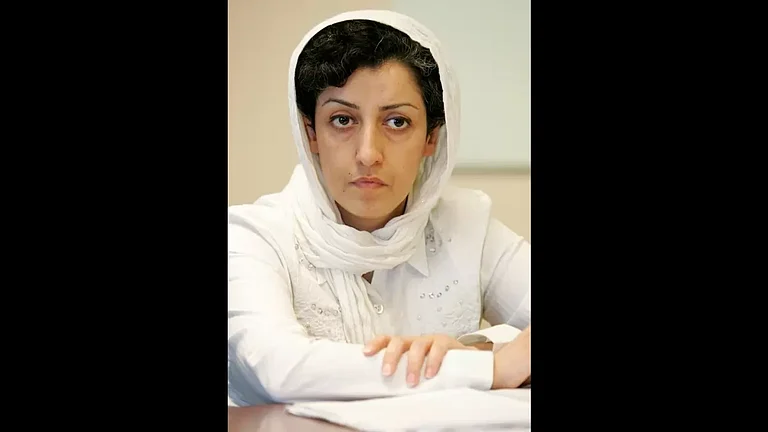IF you see a distinguished stranger wearing a patently false beard in New Delhi over the next few weeks, there's an easy way to tell if he's beleaguered author Salman Rushdie in disguise. Look for the advance guard - the armed security men whose distinctive presence signals a vip's advent in the capital city.
As British citizen Salman Rushdie plans for a probable visit to the land of his ancestors, New Delhi has assured London that his safety won't be in doubt. In other words, Delhi says it can deal with the loud calls of the Shahi Imam for the death of the man who wrote the allegedly blasphemous novel, Satanic Verses, and with death threats in the Iranian press. That might not be easy to do, considering the vehemence of the threats. We want him dead, says Syed Abdulla Bukhari, the Shahi Imam of Delhi's Jama Masjid. The government, which has granted his visa and plans to provide security, has dug its own political grave. Bukhari's son, the Naib Imam at Jama Masjid, has already led protests against Rushdie's visit.
Rushdie has not visited India since his book was banned in 1989, but was recently granted a visa to visit the country once again. According to his lawyer Vijay Shankardass, Mr Rushdie is very pleased indeed because he has not been to India since 1987. The writer, who has definite plans to visit New Delhi, has also asked Shankardass to turn his Solan property (caught for a while in a legal wrangle with the government of Himachal Pradesh) into a retreat for writers and artists.
Rushdie has lived under a cloud ever since Iran's revolutionary leader, the late Ayatollah Khomeini, issued a fatwa in 1989, declaring that Muslims had a religious duty to kill Rushdie for blasphemy against Islam. Iranian journalist Salman Ansari-Javid said recently, Rushdie, after hurting the sentiments of over one billion people, never voiced his sorrow over what he had done. Another Iranian journalist, Mojgan Ahmadvand, said that she did not believe that the writer will dare to visit India as he knows the consequence.
Characterising him as this most hated, blasphemous and disgraceful person, the Teheran Times thundered: Providence may have destined this shameless character to meet his nemesis where he was born. And just to make matters perfectly clear, the Persian daily Zan reported a few days ago that the 'Fedayeen (devotees)', a group devoted to preserving the 'pure' Islam, is currently using all means at its disposal to plan the implementation of the death sentence.
While most supporters of free speech in India are glad that Rushdie might be dropping in, they are also apprehensive. It's very good that he is coming, says publisher Ravi Dayal cautiously, but I'm a bit worried about the lunatic fringe that might ruin his stay.
And fears are being voiced that the often unsubtle security awarded to death list targets by the government of India in the past might just fail to protect the world-famous writer. According to Julio Ribeiro, former Director General of Police in Punjab and occasional advisor to the government of India, Rushdie will probably have a 24-hour armed guard, security personnel, and a vehicle with four officers following him wherever he goes, in eight-hour shifts. The exact nature of the protection given to him, however, will be worked out only after dates of his visit are announced.
Washed underwear hanging near pitched tents outside Khushwant Singh's flat in Delhi's Sujan Singh Park is how one resident recalls the heavy but very obvious blanket of security awarded to the writer after Operation Blue Star and the Punjab insurgency. While Khushwant's fellow residents resented the intrusion into their parking lots and their privacy, nothing meaningful came of their recriminations. The guards often fought amongst themselves and seemed more of a threat to each other than to anybody else, says a resident. At more convivial moments they could be seen at the chaiwala's, loudly regaling an awestruck audience with anecdotes about the vip in their care. By all accounts, discretion was not a part of the security routine.
But often that is part of the package. Ribeiro points out that the emphasis is usually placed on the numbers, rather than the alertness, of the security agents. One tale that did the rounds of Sujan Singh Park told of how a thief ran off with a pistol belonging to one of Khushwant Singh's unsuspecting guards. Personally I believe that if he (Rushdie) was in a Western country they would put just four or five highly trained personnel in charge of him because the intelligence there is quite good, says Ribeiro.
If Rushdie does come to India, however, he would merit security at the highest level, says Ribeiro New Delhi cannot afford any risk to his life from either inside or outside the country. Unless they give him Z security, it is difficult to ensure that no such thing happens. The threat isn't merely internal, there's also a chance of danger to Rushdie from external forces. But even top-level protection is not infallible - as demonstrated by Rajiv Gandhi's assassination on May 21, 1991.
It is only after we have dates that we can work out the threat perception and make an assessment, though of course we vaguely know what kind of threat he's facing, says Delhi Police Commissioner V.N. Singh. I have not been officially informed about the visit yet.
Singh says that he's not even sure whether Rushdie will visit Delhi, or will restrict himself to Mumbai and Shimla, the seat of his ancestral home. Officially, the Delhi police are barred from contacting the British authorities who have successfully guarded Rushdie for the last nine years. They must depend on the government of India as the mediator - a system that works beautifully, says V.N. Singh.
But this contradicts well-placed official sources in London, who say that a special team of Indian police officers has already contacted Scotland Yard and held discussions on the question of Rushdie's security. According to these sources, the security will follow the pattern set in Britain: the key element will be surprise and secrecy rather than a heavy saturation cover. Rushdie has also been known to venture out incognito - a longish fake beard is one of his favourite disguises. He is expected to either fly Air India, where full security won't be a problem, or British Airways, which has only just lifted a ban on carrying him. While the writer already has armed guards round-the-clock, his real security comes from keeping his location a secret, and making frequent and undeclared changes in his routine.
Demonstrations are likely to be less effective if people don't know where he is, sources in London said. This system is radically different from that followed by other Indians on hitlists, and it's a moot point whether New Delhi will be able to adapt to the British way. V.N. Singh is confident, though, saying that the authorities here will take just 24 hours to put the machinery in place once they know the details of the expected visit.
For Rushdie, there is a silver lining amid the warnings. The financial costs of being a target are huge - sources estimate that Scotland Yard security costs the British government over a million pounds a year, and Rushdie makes his contribution from his royalties. In New Delhi, however, the eminent writer will be an honoured guest, and won't be asked to pay for security arrangements in India.
All that remains is for the Indian government to fulfil the good host's other obligation towards a guest send him back home in one piece.


























